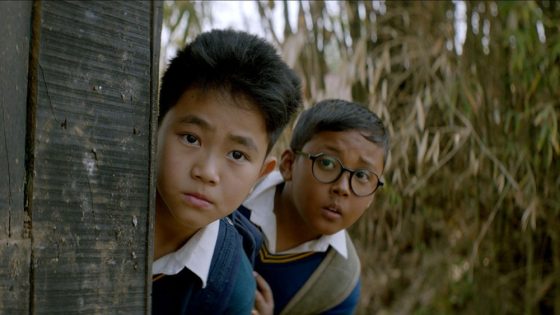A political exploration gift-wrapped in a coming-of-age drama, Lakshmipriya Devi‘s debut feature “Boong” follows its lively titular schoolboy on an adventure along India’s militarized eastern border. In search of his missing father, Boong (a firecracker Gugun Kipgen) helps paint a portrait of modern Manipur, the isolated Indian state neighboring Myanmar, at a time when violent eruption feels all but inevitable.
As it happens, the state did, in fact, descend into ethnic conflict not long after “Boong” wrapped production, making Devi’s film a bittersweet time capsule. When the film begins, Boong is a mischievous prankster with spectacular aim. His father, Joykumar, taught him how to use a slingshot before leaving for the border city of Moreh in search of work.
Boong’s teachers don’t quite know how to handle or punish his amusing practical jokes, like when he recites Madonna’s “Like A Virgin” when asked to lead his school in prayer. His mother Mandakini (Bala Hijam) recognizes that her son is languishing in this second-tier institution, so she transfers him to a fancier school where English is the lingua franca, in the hopes of giving him a leg up later on in life. However, this also exposes Boong to a wider cross-section of cultural discrimination, from the rich girl in his class who boasts about vacationing in New Delhi, to the casual slurs thrown the way of his endearing, dark-skinned best friend Raju (Angom Sanamatum), an “outsider” whose father migrated from the nation’s interior.
Kipgen and Sanamatum make for a delightful pairing, as Boog deals with his topsy-turvy new status quo with sass and a smile. However, his happy-go-lucky demeanor can only go so far. His father has stopped responding to the family’s phone calls and, after a while, news even reaches them that he may have died, though the circumstances of this news seem suspicious. On one hand, Devi unfurls a minor tale of intrigue far away from Boong’s gaze, when Mandakini begins looking into where Joykumar might be, and why local politicians might be so eager to declare him dead. In the process, hints of the surrounding political tensions comes to the fore, raising suspicions that Joykumar might be involved with some kind of rebellious activity against the oppressive government.
However, as far as Boong is concerned, his father is simply away on work, and he believes the cure to his mother’s malaise is bringing Joykumar back to her as a surprise. In order to achieve this, he and Raju sneak away to Moreh and begin asking around, revealing a multi-faceted (and at times dangerous) tapestry that simply comprises a childlike adventure for Boong — a disconnect in narrative point of view that speaks volumes the further the film goes on.
As questions about Joykumar’s whereabouts are raised, Boong and Raju stumble toward potential answers that reveal, to the audience, a dynamic world along India’s border, from migrant workers to Manipur’s blossoming transgender community — both of whom, one might intuit, likely face dangers from the armed soldiers at every corner — through neither boy has the wherewithal to full absorb the breadth and beauty of their journey. However, once Boong finally learns the truth about his father, the spry young lad is faced with a choice that requires a definitive step toward adulthood and maturity, one of several minor challenges with which he’s confronted.
Devi, through her gentle approach to Boong’s story, centers an innocence and naiveté under threat from steadily brewing forces. And though she doesn’t train her lens on this steadily evolving scenario, she makes it an ever-present part of her movie’s fabric, as ensuring that this political texture remains inseparable from her intimate personal tale.
Source Agencies


